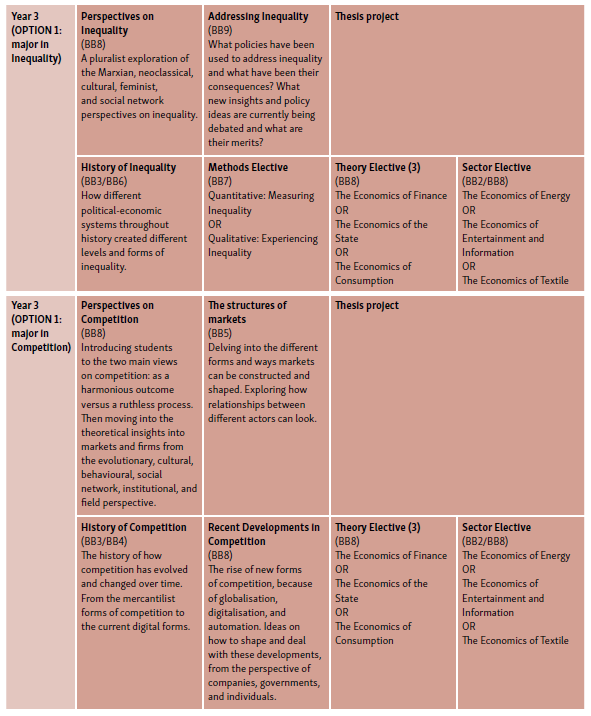Programme slogan: A diverse toolkit for understanding the economy
Example Curricula
This chapter provides examples of how economics programmes could look and be structured. Such proposals help make the debate concrete and bring out potential trade-offs. This is important because critics of current programmes often simply ask to teach more and more, without considering practical limits on time and content. Curriculum proposals help us to flesh out not only what could be added to a programme, but also what could be left out. In addition, these examples show how the building blocks of Economy Studies can be combined to form coherent programmes.
This chapter is also intended to make clear once again: Economy Studies is not a blueprint of a single, ‘ideal’ curriculum. It is possible to design a wide variety of programmes with these building blocks, and it is our hope that they will be used for this. We firmly believe that the world is best served with a wide variety of economists. One size does not fit all.
Example Curricula:
- Bachelor in Economics with a Theoretical Focus
- Bachelor in Economics with a Real-World Focus
- Major Economics in a Liberal Arts and Sciences Programme
- Master in Public Economics
- Design Your Own Curriculum, Step by Step
- Master in Financial Economics
- Master in Economics of Climate Crises
- Research Master in Industrial Economics
Example Curriculum 1: Bachelor in Economics with a Theoretical Focus
This programme is a general economics bachelor programme, preparing students for a master’s in economics and for work in government agencies or the private or non-profit sector. At the end of the degree, students will have gained a thorough overview and understanding of the main body of economic theory and the economic system in which they live and will work. They will have gained some experience in applying this theory to solve concrete problems, will be able to conduct independent research using a range of methods, and will have a brief specialisation in either inequality or competition.
This programme stacks the ten building blocks of Economy Studies in a relatively simple and straightforward way. The first year of the programme includes real-world economics (BB2, BB3, BB9), its normative relevance (BB1, BB10), and introductory courses in methodological and theoretical tools and concepts (BB4, BB7, BB8). In these courses, students explore their chosen topic of study, ‘the economy’. They become knowledgeable about the main societal challenges of our time and the economics underpinning them. They learn more about the vital sectors and institutions of the economy around them, and learn to see in what ways this complex system is intermingled with areas such as our personal lives, the environment and international political relations. In addition, they are introduced to the basic toolkits of the academic world: theories and methods.
The second year is focused on specialised methods courses (BB7) and deep-dives into theory (BB8). Besides these theory and method courses, students are also taught conceptual and real-world knowledge about the different ways in which economic processes can be organised, both at the micro and meso level (BB5) as well as at the macro level (BB6). The second semester of the second year also picks up on the real-world economics (BB2) and normative aspects (BB10) discussed in the first year. The theory electives are organised using the Pragmatic Pluralism approach, teaching subject-based theory courses on issues like economic development, nature, and consumption. In each theory course, the subject is approached from 2-4 theoretical angles. This serves to highlight different aspects of the economic subject in question. It also teaches students the vital academic skill of selecting and combining the most relevant perspectives. The methods courses allow students to specialise in specific sets of methods that fit their personal talents and ambitions.
In the third year of this example curriculum, students have the choice between two majors: Competition, or Inequality. We assume, for the sake of the example, that the department teaching this particular programme has strong expertise there, but such choices would always depend on the locally available knowledge. Both of these majors have the same basic structure. They start with side-by-side courses on the history of the economic phenomenon in question (competition or inequality) and the different ways of thinking about that phenomenon.
In the case of the inequality major, these two courses are followed up by a practically oriented policy course on how to address inequality and a specialised methodological course on how to best capture and understand inequality by making use of qualitative or quantitative research tools. Students choosing the competition major continue with a theoretical course on the varying institutional structures which markets can have, coupled with a practically oriented policy course devoted to better understanding current developments in competition, the nuts and bolts of managing these, and its future directions.
In the last semester of the programme there is the 15-ECTS bachelor thesis project, in which students tackle a concrete economic question themselves. There are also two final courses. One is an additional theories course. The other is a ‘sectoral elective’, a deeper dive into a specific sector, tying together much of the theoretical material taught earlier by applying it to a real economic sector.
This example curriculum, in short, provides a straightforward use of the Economy Studies building blocks and principles, as well as the theme-centred theory teaching described in Tool 1: Pragmatic Pluralism.
Programme overview

